Lisa Pitzer, Manager of Corporate Services and one of Covington’s biggest baseball fans, contributed her story about her first-hand Japanese baseball experience.
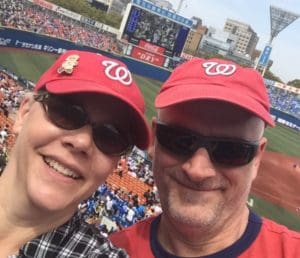 If you’re a baseball fan, you probably know that baseball is big in Japan. Many MLB players that haven’t signed to a Major League team take a season or two to play in Japan to keep their skills sharp or to extend their careers. My husband and I had an opportunity to go to Japan recently, and at the top of my “must-do” list was a Japanese baseball game. To say that the Japanese take baseball seriously is an understatement. The enthusiasm is contagious!
If you’re a baseball fan, you probably know that baseball is big in Japan. Many MLB players that haven’t signed to a Major League team take a season or two to play in Japan to keep their skills sharp or to extend their careers. My husband and I had an opportunity to go to Japan recently, and at the top of my “must-do” list was a Japanese baseball game. To say that the Japanese take baseball seriously is an understatement. The enthusiasm is contagious!
Choosing a Game and Getting Tickets
We did some research before our trip and found a website that has translated schedules so you can choose your game. As it turned out, there was only one game that we were able to attend – on the very first, jet-lagged day of our two-week trip. You can also purchase tickets from this website, but we decided to wait and purchase the tickets on game day at the stadium.
In less than an hour on the train, we made the trip from Tokyo to Yokohama to see the Yokohama Baystars versus the Tokyo Yomiuri Giants. As we got off the train, we followed the crowd to the stadium where the energy was already festive several hours prior to game time. Vendors were selling souvenirs and there were bouncy houses and children’s games in front of the stadium. We purchased our tickets with little difficulty, even though the ticket seller knew very little English and we knew very little Japanese. We did have to specify if we were rooting for the home team or the visitors, as that dictated where we would sit.
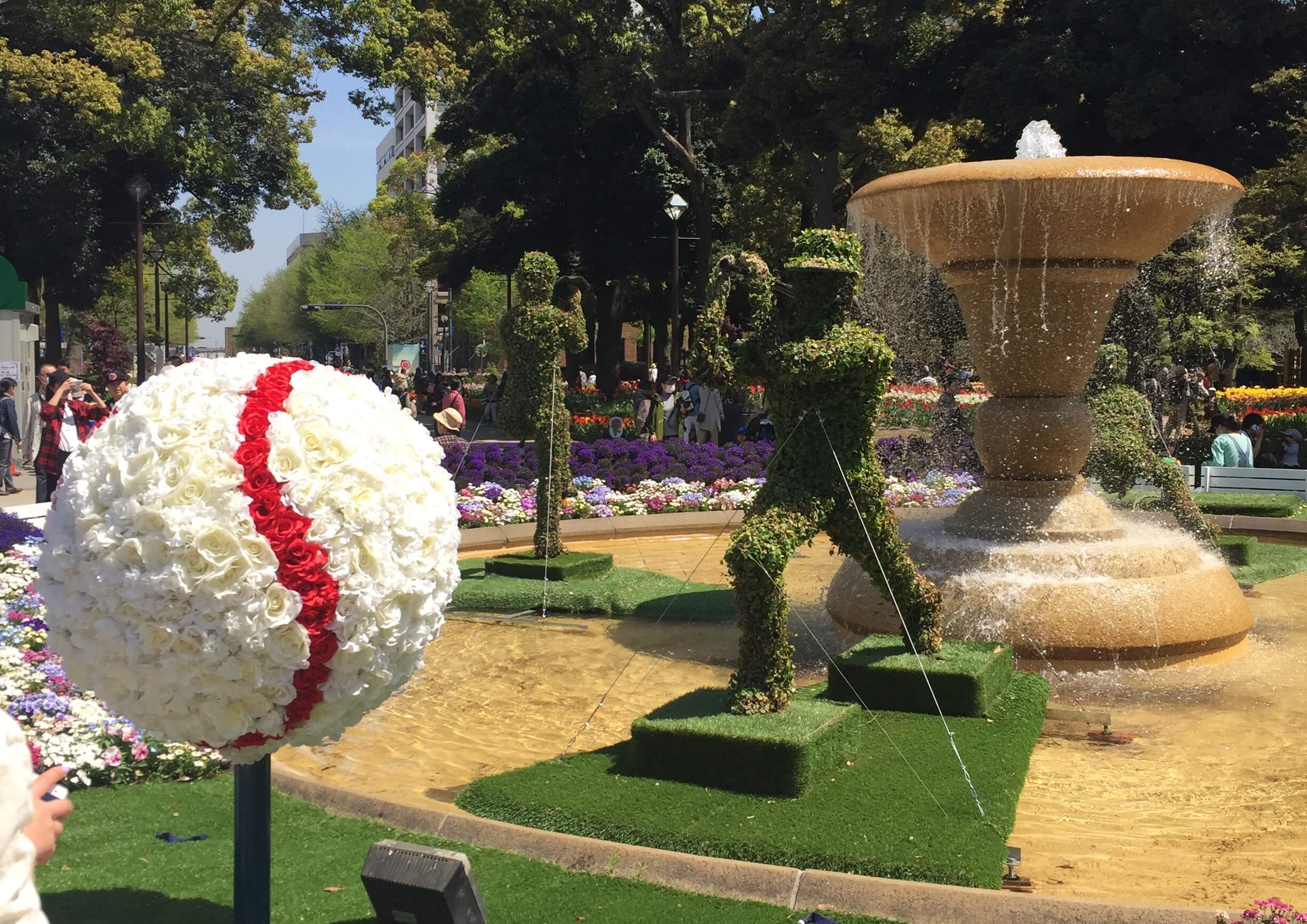 Yokohama is a lovely harbor city, and because the baseball stadium is located near the harbor and surrounded by the city, it reminded me very much of Baltimore. There was a Spring Garden Festival happening, so the streets were lined with “pop-up” gardens from different regions in Japan to showcase their regional plants and flowers. In front of the stadium were breathtaking tulip beds and baseball players made of flowers. The Japanese also take their gardening very seriously.
Yokohama is a lovely harbor city, and because the baseball stadium is located near the harbor and surrounded by the city, it reminded me very much of Baltimore. There was a Spring Garden Festival happening, so the streets were lined with “pop-up” gardens from different regions in Japan to showcase their regional plants and flowers. In front of the stadium were breathtaking tulip beds and baseball players made of flowers. The Japanese also take their gardening very seriously.
But I digress. You’re not reading this blog to hear about flowers – it’s about Baseball!
Japanese Baseball Food
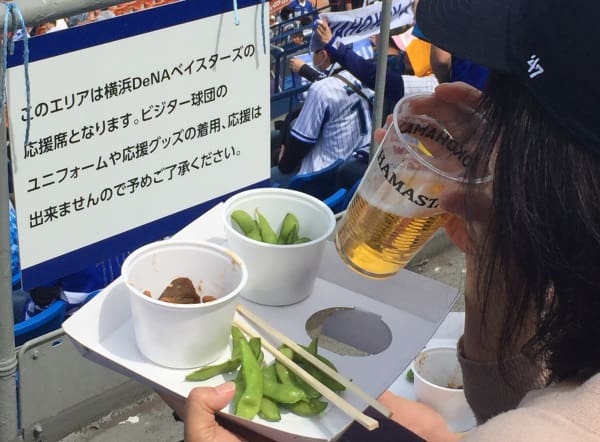
As we made our way to our seats, we realized the stadium was about the same size as most baseball stadiums back in the US. The place was packed, if not completely sold out. Young women with “backpack” kegs on their backs made their way up and down and across the sections selling cold beer. Immediately, we noticed that baseball food in Japan is a bit different than back home. The woman in front of us was holding the familiar cardboard snack tray, complete with a holder for her beer, but was snacking on edamame and eating some sort of meat with chopsticks. The man to my left was eating noodles with a fried egg on top, stuffed into what appeared to be a hot dog bun. We watched several people walk by with what looked like snow cones piled high with mandarin orange slices. It seemed that the Japanese had a twist to every U.S. baseball snack, although for the record, I never did see peanuts or Cracker Jacks.
The Game isn’t the Only Entertainment
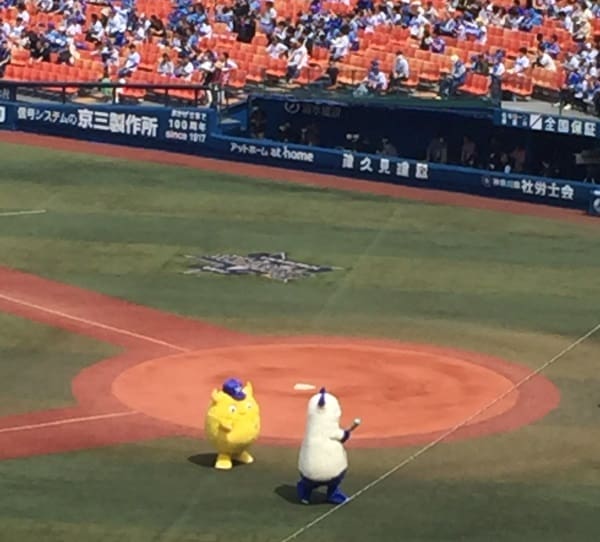
As the players were introduced, we recognized the Giants’ pitcher, Ross Ohlendorf, who briefly pitched for our beloved Washington Nationals! The pitcher for the Baystars, Phil Klein, was also an American and we recognized a few other names from MLB.
The Baystars had two mascots, Bart and Chapy, and in true Japanese fashion, they were adorable. The Baystars also had a cheerleading squad whose responsibility is to lead the crowd in song and dance.
Every baseball player in Japan apparently has their own song, and I’m not talking about pop song “walk-up” music here. Everyone and I mean everyone in the stands sang and knew all the lyrics. We later saw the free pamphlets that include the lyrics for each individual player’s song, as well as the words to the Team Song and the accompanying dance moves. Dance moves, you say? Yes, baseball is a very interactive sport in Japan! With repetition, we started to learn the songs and had our favorites. We looked forward to when Yoshitomo Tsutsugo was up at bat again so we could hear his song!
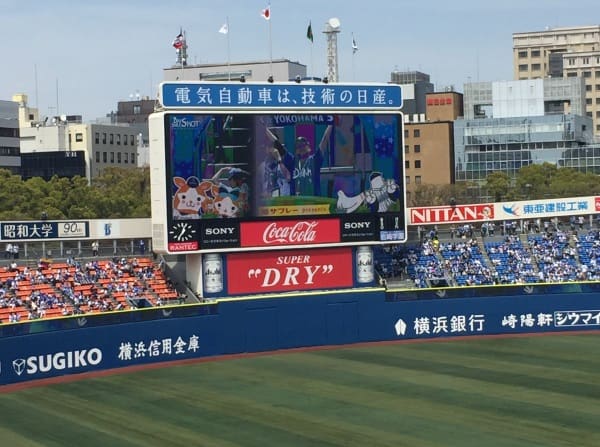 Each team has their own band, complete with drums, horns, the works! In the “visitor” section, a whole section of Giants fans surrounded the Giants’ band. Of course, their players also each had their own songs. When the Giants hit a home run, their fans pulled out small umbrellas (maybe 8”-10” diameter) and bobbed them up and down in tune to what we guessed was their “home run” song? It was at this point we decided it would have been nice to have a translator to explain the ins and outs of Japanese baseball to us.
Each team has their own band, complete with drums, horns, the works! In the “visitor” section, a whole section of Giants fans surrounded the Giants’ band. Of course, their players also each had their own songs. When the Giants hit a home run, their fans pulled out small umbrellas (maybe 8”-10” diameter) and bobbed them up and down in tune to what we guessed was their “home run” song? It was at this point we decided it would have been nice to have a translator to explain the ins and outs of Japanese baseball to us.
Not to be outdone, the Baystar’s band led a rally of their fans, and we loved hearing the entire stadium erupt into song. Even the 4-year old boy next to us knew every word, and never missed a beat.
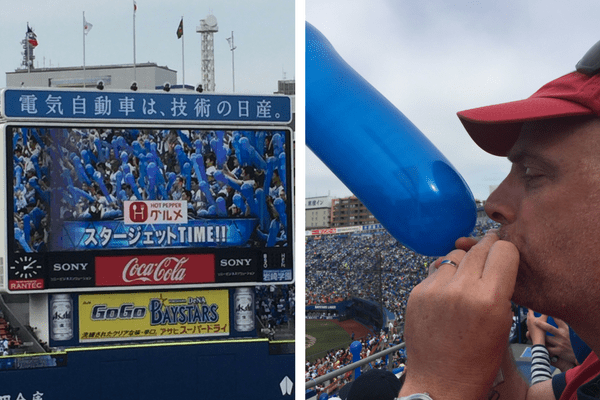
In the middle of the seventh inning, it was time for the Seventh Inning Stretch… Japanese style! Everyone pulled out blue balloons and began blowing them up until they were about 2 feet long. The small boy next to us handed us a balloon so we could participate. The video scoreboard counted down, and at zero, everyone released their balloons in a frenzy of flying blue rubber! It was magnificent! Of course, this was accompanied by the singing of the Team Song sung at the top of everyone’s lungs, accompanied by the band. Across the stadium from us, stretched over three entire sections, a huge “Yokohama” banner was unfurled, waved back and forth by the fans in those seats. Keep in mind, this was an early season regular game with definite “postseason” energy. The only thing we’ve experienced close to this was a Nationals playoff game, but this apparently is the norm during every single game in Japan. I’d love to see what they do for the playoffs!
After the Game
Of course, baseball is baseball, and the game was easy enough to follow. We did not see any “challenges” to any of the calls made, so they are still playing it old school. The Baystars home team was victorious, and the game came to an end – or so we thought. In the U.S., many fans race to the exits as soon as the final out is called, vying to get out of the parking lot first and beat the traffic home. Not in Japan. Every single Baystars fan stayed glued to their seat. However, the visiting Giants all seemed to disappear in the blink of an eye, including the band! We looked around to see what would happen next, but to these fans, the event wasn’t even close to being over.
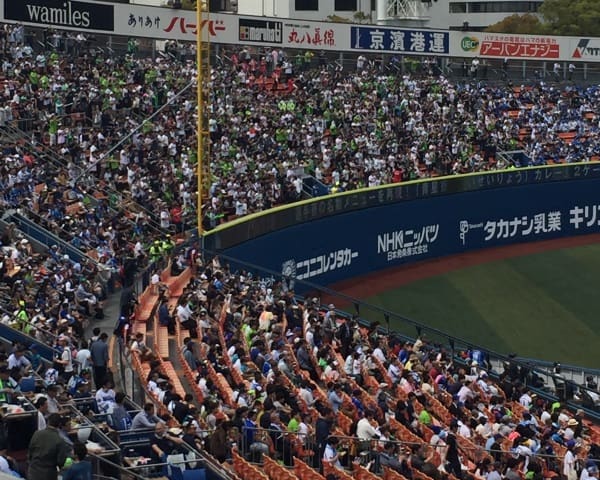 As the cheerleaders and mascots led the crowd in song and dance, a stage was rolled onto the field, complete with red carpet, and what appeared to be an elaborate fireworks display. Then they announced two “Star Players” of the game, presented them large bouquets of flowers and interviewed them at great length. The pitcher, Phil Klein, was one of the Star Players. He answered the interviewer questions in English, which were then translated into Japanese for the crowd. The second Star Player spoke Spanish, and his answers were likewise translated. This went on for some time, and it seemed again to us that the Japanese treat every game like it is a playoff game, and revel in the ceremony and recognition of the players. Only after the fireworks did the crowds begin to disperse. I guess it helps that there are no parking lots or traffic jams to worry about, as the majority of the fans boarded trains to go home.
As the cheerleaders and mascots led the crowd in song and dance, a stage was rolled onto the field, complete with red carpet, and what appeared to be an elaborate fireworks display. Then they announced two “Star Players” of the game, presented them large bouquets of flowers and interviewed them at great length. The pitcher, Phil Klein, was one of the Star Players. He answered the interviewer questions in English, which were then translated into Japanese for the crowd. The second Star Player spoke Spanish, and his answers were likewise translated. This went on for some time, and it seemed again to us that the Japanese treat every game like it is a playoff game, and revel in the ceremony and recognition of the players. Only after the fireworks did the crowds begin to disperse. I guess it helps that there are no parking lots or traffic jams to worry about, as the majority of the fans boarded trains to go home.
Japanese Baseball ‘How To’ Tips:
As I mentioned, it would have been nice to have someone translating and explaining as we watched, so bring along a Japanese friend, or make a new friend at the game.
While it’s not necessary to buy tickets in advance, apparently many games do sell out, so if you have your heart set on seeing a particular team, buy your tickets in the U.S. and have them delivered to your hotel in Japan, but keep in mind there is a fee to do so.
The Japanese baseball season mirrors the U.S. season, starting in early spring and wrapping up in October, so plan accordingly.
Contact Covington vacation advisors to arrange your trip to experience the fun of Japanese baseball.






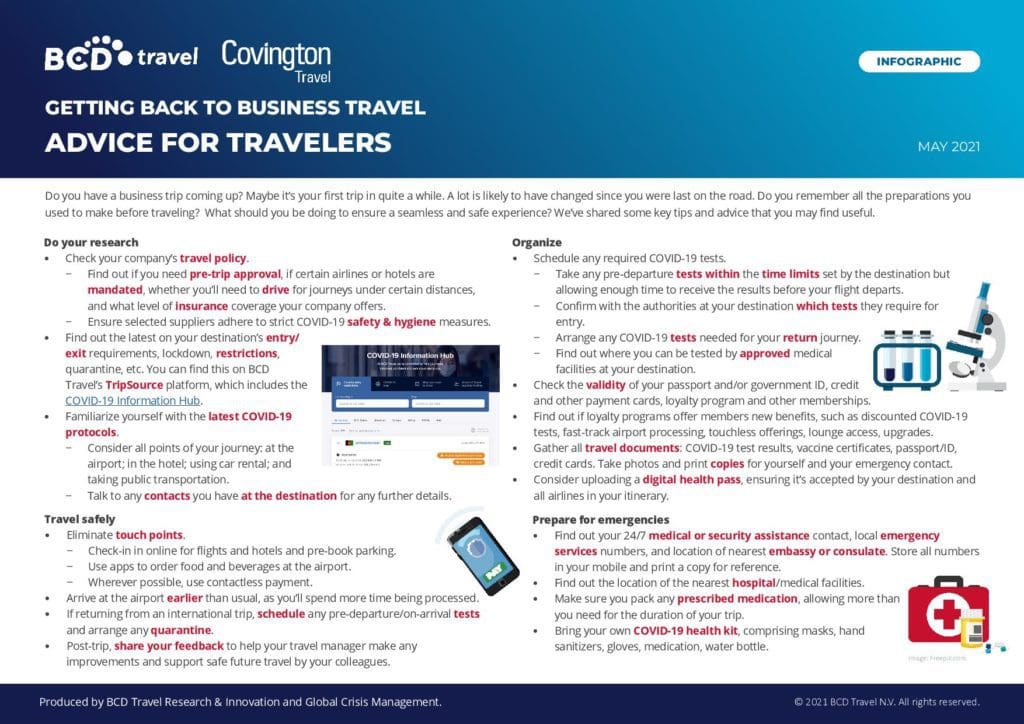
Leave a Reply